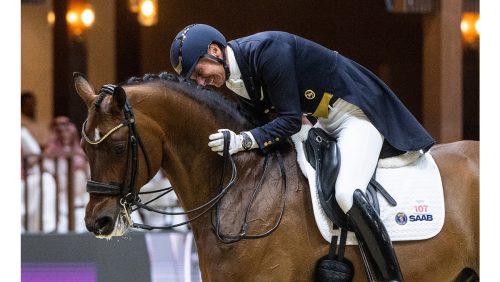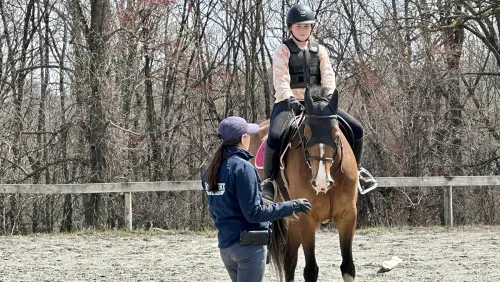Me: Do you think I can do it?
Trainer: I know you can do it.
Me: What if I miss the distance?
Trainer: If you miss it, you miss it. Just look up and keep your leg on.
Me: What if I accidentally squeeze him off the ground from 10 feet away and make him leap at it and then he retaliates on the other side?
Trainer: Um. Just try not to do that.
That’s the conversation I had before cantering my horse Kingston over a cross-rail for the first time since he came back from his lease (and the first time since he threw me off last year).
Yes, a cross-rail, and yes, just a short time after a week at Thermal competing in the 2’6 equitation and the .80 jumpers—still not very high compared to my goals, but high enough that a cross-rail should not be terrifying.

What’s going on in that head? Photo by Lindsey Steele
I’m about two years into my re-riding career and my physical skills have come along pretty well. My heels are usually down, my shoulders are generally back. I can feel a lead, I can post without stirrups, and I can hold a two-point position indefinitely at all gaits. I could do none of those things two years ago.
I read every horse book I can get my hands on and I watch every how-to video I can find, from how to pack hooves to how to walk a course. I study the best grand prix and hunter derby riders. I’ve developed a knowledge base that is both broad and deep. I know a heck of a lot more than I can actually do at this stage, but I’m OK with that.
So in two years I’ve improved my physical skills exponentially, and I’ve become appropriately knowledgeable about the sport. Yet there are many times that my riding reflects neither of those things. Like when I see flames coming out of the standards or a two-headed monster swimming below a cross-rail, and my mind goes completely blank. It really doesn’t matter how much you know or how good your position usually is when you go into panic mode—and the fetal position—upon approaching the fence.
ADVERTISEMENT
My problem became glaringly obvious on a day a few weeks ago when, just hours apart, I jumped my green mare Aria over a 3’6 vertical (on a dare), and then cantered two cross-rails in a line on Kingston. Both tasks took an equal amount of courage.
And yes, it’s partially understandable because I had a bad fall on Kingston. But it’s been a year since then. I’m a better rider and Kingston is an impeccably trained horse who is quiet as long as his rider isn’t having a full-blown anxiety attack on his back. (Even then he will do his best to help; for example, he will stand patiently with no one holding him if you need to slide off to throw up in the hedges. I know this for a fact.)
The point is, I am a decent rider and I am suitably mounted. I ride well enough to get around a course. The problem isn’t in my seat, hands, legs, or eyes; rather, it’s in the bit of gray matter between my ears. I have a mental skills problem.
Deep down, I have always known that I needed to address this area, but I’ve deftly avoided it. I would rather ride without stirrups for a month. I would rather scrub buckets. I would rather do push-ups. Like every equestrian worth her salt, I’m not afraid to work.
But there’s something about digging into my own psyche and trying to somehow control the inner dialogue that is JUST. SO. UNCOMFORTABLE. The idea of mental training makes me want to either (a) drink heavily or (b) throw a toddler-style screaming and kicking temper tantrum. Or maybe both at the same time.
I would humbly submit that my brain, just as it is, has gotten me pretty far: a near-perfect GPA throughout school, a degree from a great university, a successful career.
Sure, maybe my head spins with a sizeable dose of perfectionism, a bit of anxiety, and a dash of obsessive-compulsiveness. But whose doesn’t, really? The brain is the most complex and the least understood organ in the human body. So I’ll just leave mine be, thank you very much.
But on the other hand, I desperately want to be a better rider. And if that means doing something uncomfortable, I guess I’ll give it a shot. So when my trainer announced that mental coach Mario Soto was coming to do a session at our barn, I was the first to sign up. I figured I’d at least hear what he had to say.
He gave us a handout with some key pieces of advice. As soon as I got mine I started laughing. I wasn’t being disrespectful; it’s just that this blog post was writing itself.
For example, Coach Mario said to eat frequent small meals to maintain energy at shows. I totally do that: five to eight small meals consisting of one mimosa each.
He also said to visualize accomplishing your goals before your round. I visualize, for sure, but my visuals tend to include choking up to the first vertical or crashing into the single oxer. He gave suggestions for connecting with your horse in the warm-up ring, but oddly didn’t mention my personal favorite tactic, which is simply whispering “you’re not gonna kill me today, right?” while staring deeply into my horse’s eyes.

Whispering sweet nothings or pleas for mercy? Photo by Captured Moment Photography
ADVERTISEMENT
Coach Mario advised us to come up with an individual routine that helps us get in the zone. It could be spending time alone or listening to music, whatever it takes to get into a clear headspace.
I may need to work on that, as my current pre-show routine consists of nervously pacing back and forth between the barn and the arenas, monitoring the ring crew as they set the jumps to make sure they have not accidentally put one of my fences a millimeter higher than it should be, feeding my horse carrots in a blatant and transparent attempt at bribery, spying on the competition in the warm-up to see if anyone else looks panicked, considering hobbies that do not involve large flighty animals, having another mimosa, and asking my trainer no less than 16 times if it’s time to get on yet.
I was pleasantly surprised that Coach Mario did not try to psychoanalyze anyone. Instead, much of his advice included specific actions or tasks. I can do tasks. I’m great at tasks. I can totally make a small goal before each ride, for example. And at the end of each schooling day I can make an effort to think about what went right, to help cultivate a positive mindset, rather than dwelling on what went wrong.
The session with Coach Mario inspired me to pick up a book I had received at a riding workshop but was afraid to read, Tonya Johnston’s Inside Your Ride: Mental Skills for Being Happy and Successful with Your Horse.
The words “mental skills” had been just too daunting to me. But as with Coach Mario’s program, I was pleasantly surprised by Ms. Johnston’s book. It’s not about forcing your brain to change its dialogue; at least, not directly. Instead, she offers breathing exercises, tips for planning and focusing your ride, and ways to become more positive.
The idea of changing my brain may be tantrum-inducing, but I can certainly breathe in and out a few times and visualize what I want my ride to be like, and I suppose I could even say a couple positive things to myself every so often.
I avoided “mental training” for a long time, thinking it was something far scarier than it actually is. I still don’t like the term, hence the title of this blog post. But if I just think of it as little tasks, it becomes simple and manageable. Habits do change your brain, but they do it slowly and usually pretty painlessly.
In trying to get over those first few cross-rails back with Kingston, I was not only visualizing disaster, but I was also voicing it and expecting it.
My mind was making things far worse than they really were. But now I know I can do a couple little “mental” tasks to drastically improve my chances of success. I still reserve the right to occasionally over-think and get overly anxious—what kind of adult amateur would I be otherwise?!—but now I have a few tools to refocus and re-center.
Lindsey Long lives in Southern California with her one tabby cat, two Great Danes, two hunter-jumpers, and a husband. She recently returned to riding after a 15-year hiatus and is desperately trying to make up for lost time while balancing a full-time job rife with deadlines. Her goals include winning pretty ribbons, finding appropriate distances with some degree of consistency, and not losing her breakfast at the mere thought of a hunter derby course.














